The usual nonsense where some non-entity witters on about their immensely dull life
Search This Blog
Wednesday, March 29, 2006
Tuesday, March 28, 2006
Wrapped Up In Books
Manybooks.net has a fine range of texts, with handy previews to give you an idea of what you're getting. There's the option of assorted download formats, for those of you with fancy gadgetry. Here are a few examples of the titles available on the site.
- In Defense of Women - H.L. Mencken
A man's women folk, whatever their outward show of respect for his merit and authority, always regard him secretly as an ass, and with something akin to pity. His most gaudy sayings and doings seldom deceive them; they see the actual man within, and know him for a shallow and pathetic fellow. In this fact, perhaps, lies one of the best proofs of feminine intelligence, or, as the common phrase makes it, feminine intuition. The mark of the so-called intuition is simply a sharp and accurate perception of reality, an habitual immunity to emotional enchantment, a relentless capacity for distinguishing between the appearance and the substance. The appearance, in the normal family circle, is a hero, magnifico, a demigod. The substance is a poor mountebank.
- Hold Up Your Heads, Girls! - Annie H Ryder, 1886
Do not be afraid of useful fancy work. One can rest delightfully while making a row on an afghan, or knitting on a bed slipper. I always pity a boy who never seems to have any way of occupying himself while he rests. He whistles, puffs a cigarette, perhaps, or whittles away at the window-seat. Girls have no need of being lazy while they rest. They certainly will not sit in lawless indifference if they know the blueness of discontent. Cheerful people are workers; and, when they find any tendency to go "mooning" over their tasks, they shake themselves into broad daylight.
- A Parody Outline of History - Donald Ogden Stewart
The Courtship of Miles Standish - in the manner of F Scott FitzgeraldThis story occurs under the blue skies and bluer laws of Puritan New England, in the days when religion was still taken seriously by a great many people, and in the town of Plymouth where the "Mayflower", having ploughed its platitudinous way from Holland, had landed its precious cargo of pious Right Thinkers, moral gentlemen of God, and - Priscilla.
Priscilla was - well Priscilla had yellow hair. In a later generation, in a 1921 June, if she had toddled by at a country club dance you would have noticed first of all that glorious mass of bobbed corn-colored locks. You would then, perhaps, have glanced idly at her face, and suddenly said "Oh my gosh!" The next moment you would have clutched the nearest stag and hissed "Quick-yellow hair-silver dress-oh Judas!" You would then have been introduced and after dancing nine feet you would have been cut in on by another panting stag.
For those quaint old-fashioned souls who prefer an actual book when you're reading, you could do worse than head to What Should I Read Next? if inspiration temporarily deserts you.
Thursday, March 23, 2006
Vindicated at last
For centuries people were burned at the stake, stretched to death or otherwise tortured for failing to be Roman Catholic. But, if research released by the Vatican is right, the Inquisition was not as bad as one might think.
According to the documents from Vatican archives relating to the trials of Jews, Muslims, Cathars, witches, scientists and other non-Catholics in Europe between the 13th and the 19th centuries, the number actually killed or tortured into confession during the Inquisition was far fewer than previously thought.
Ever since I did a project on the subject at university many moons ago, I've been defending the Spanish Inquisition against its bad reputation. Those investigated in Catholic countries in Europe had a far better chance of survival than in the newly Protestant nations, where hysteria may have been linked in some way to the insecurity of a newly established religious system.
In Italy and Spain, a more likely punishment was to be made to parade in front of the church on a Sunday while holding a sign outlining the offender's heretical status, punishments designed more to shame the guilty party into rejoining the church community than to cast them out altogether.
The British and Germanic states were about the worst places to face accusation of witchcraft, with greater use of torture to extract a confession, and harsher punishments for people found guilty.
Of course, these inaccurate perceptions are all the fault of a bunch of comedians. Those naughty Monty Python boys have a lot to answer for, what with their duck's weight theories, and graphic use of cushion torture...
Wednesday, March 22, 2006
All the news that's fit to print

Mrs Storer, who had been an art teacher for 26 years, says that she was subjected to four years of overwork, intimidation and stress after joining the 1,000-pupil school in April 2001. She said that her "farting chair" was a regular joke.
She said: "It was very embarrassing to sit on. I asked for a chair that didn't give me a dead leg or make these very embarrassing farting sounds. It was a regular joke that my chair would make these farting sounds and I regularly had to apologise that it wasn't me, it was my chair."
She said that when a consignment of new chairs arrived in May 2002 she was not allocated one. She said: "I had specially requested a chair under health and safety regulations and I didn't get one."

The latest "let's start a health scare panic" research claims that uneven breast size can increase the likelihood of cancer. Reassuring news for the 0.0001% of women with perfectly symmetrical breasticles then...
Lead researcher Dr Diane Scutt told the BBC News website the average female breast in the study was about 500ml in size, so a variation of 100ml was quite big.
She added that almost all women had some degree of breast asymmetry - just one woman who took part in the study had perfectly symmetrical breasts.
She said: "Breast asymmetry should not be considered in isolation, it is important to consider a woman's entire risk profile before assessing her breast cancer risk."
And in news which shocked absolutely nobody at all, Vladimir Romanov's latest move at Hearts has been to sack Graham Rix. After all, he'd been in the job for a few months, clearly it was time for him to go...
Friday, March 17, 2006
To be sure, to be sure

It's St Patricks Day, or as I prefer to think of it, another one of those avoid the pub at all costs days (Hogmanay being the worst of all). I'm not a fan of enforced jollity. I like to decide for myself if I'm in a mood for a party (usually not - I'm the scowling misanthrope in the corner). I don't want to spend a night surrounded by drunk eejits insisting that I enter into the "spirit" of it all, what with it being a "special night" and all. Especially when said eejits are only venturing out because of the random date on the calendar anyway.
I think the basic problem is that I never quite learned how to fake it. I can't look happy if I'm really feeling miserable, I struggle to feign interest in other people's dull small talk, and if I don't like someone, they tend to know about it pretty sharpish. Not that I'm rude (well, not always anyway) - I can do polite, having been brought up to have manners and all, it's just that honesty comes too easily for me. That may sound a little strange, but in ordinary human interaction, people tend to be looking more for self-validation than an honest assessment of a given situation. No, that outfit doesn't suit you, you did deserve that reprimand at work, and yes, you should cut back on the booze.
I was so OTT about the honesty thing as a child that I wouldn't even cheat when playing board games - if I could see an answer on the back of a card, I'd own up and ask for a new question. Lying on a regular basis seems like an awful lot of work to me. Not only do you have to remember both truth and fiction, you also need to remember exactly who knows what, and stick to the appropriate version for your audience. It's far easier just to stick to the facts, and damn the consequences. Except with your parents of course, even I'm not that stupid...
Wednesday, March 15, 2006
And while I'm here.. .more death

Here's the tribute from Cellik Telly.
One of the famous Lisbon Lions, the Celtic team who won the European Cup in 1967, Jinky spent the last years of his life fighting Motor Neurone Disease, a brave as well as a talented man.
He will be missed.
Oh my God! They satirised scientology!

Having recently seen the fabulous Team America: World Police, I'm very much loving Trey Parker and Matt Stone's work right now, so here for your viewing pleasure is the South Park episode that drove Chef over the edge.
Thursday, March 09, 2006
A veritable smorgasbord?
*That prize? The joy of knowledge. Lucky you...
It's a jungle out there
You know you're a hopeless insomniac when 6.30am finds you sitting up in bed, listening to BBC7 and eating pringles and dip. The whole disrupted sleep/keeping weird hours thing means I'm probably overly familiar with the BBC7 schedule - you know it's a bad day when you somehow manage to hear the same thing in all three of its daily airings. Having said that, falling asleep with comedy or drama in the background* is less disturbing than doing the same with a news show - dreams can get very very strange when they incorporate breaking news stories, and you can end up waking in a self-induced state of deja-hear as your conscious mind hears the news you've already been dreaming about.
It's a fine way to start the day though - even Mondays aren't so bad when you get a double bill of The Goons and Knowing Me Knowing You to cheer you up of a morn (even if there are some obvious "you can't say that at 8.30 in the morning" cuts in Mr Partridge's antics).
I've always been keen on vintage radio, from 40s and 50s US detective dramas to classic British comedy like the marvellous Round the Horne, and the existence of BBC7 was the main incentive for my purchase of a DAB radio. And radio drama has distinct benefits - why plough through a thick Victorian text (I'm looking at you, Mr Dickens) when a radio adaptation is far more entertaining and much less effort? It's the slightly less up-to-date version of gaining your knowledge of literature from reviews in the press.
As for comedy, at the risk of sounding like a convert to the Cult of BBC7, there's a fine mix of old stuff (Steptoe and Son! The Navy Lark! Dad's Army! Hancock's Half Hour! The Clitheroe Kid! okay, the last one's a tad dated, but its quite sweet in it's old-fashioned way) and more modern fare (Old Harry's Game! The Boosh! Armando Iannucci! Jeremy Hardy! Mark Steel! etc!). Not forgetting I'm Sorry I Haven't A Clue, Just A Minute and The News Quiz of varying vintages. Why, 'tis a veritable smorgasbord of comedy delights.
* I don't do silence. For the very good reason that there's no such thing. Without the radio in the background, little things like a ticking clock, rumbling pipes, your own breathing, or, god forbid, your own thoughts (must. block. the. voices....) become more obvious and annoying, to the point of making you hurl objects across the room and try to stab yourself in the ears with a sharpened pencil. Or something like that.
Wednesday, March 08, 2006
Ivor Cutler 1923 - 2006

You are the centre of your little world and I am of mine.
Now and again we meet for tea, we're two of a kind.
This is our universe, cups of tea.
We have a beautiful cosmos,
We have a beautiful cosmos.
What do we talk of whenever we meet? Nothing at all!
You sit with a sandwich I look at a roll.
Sometimes I open my mouth, and shut it.
We have a beautiful cosmos, you and me.
We have a beautiful cosmos.
You are the centre of your little world and I am of mine.
Now and again we meet for tea, we're two of a kind.
This is our universe, cups of tea.
We have a beautiful cosmos, you and me.
We have a beautiful cosmos.
Sunday, March 05, 2006
Stating the obvious, government style
* do not visit bird or poultry farms and markets,
* avoid close contact with live or dead poultry,
* do not eat raw or poorly-cooked poultry or poultry products, including blood,
* wash your hands frequently with soap and water.
And there I was, planning a weekend of raw chicken eating on the continent - I guess that's my plans ruined then...
Wednesday, March 01, 2006
Wonders of the Welsh World

St David: imagine my surprise when a quick check showed that St David was actually Welsh - I thought it was the done thing to adopt some foreign chap who'd never so much as heard of your country, never mind actually visited. Of Welsh royal lineage, and a prominent figure in church life, founding monastic orders and living a life of extreme asceticism.

Owain Glyndŵr: medieval chappie, the last Welsh Prince of Wales (once upon a time it meant something other than "one who is waiting for their parent to die"), and leader of a unsuccessful revolt against English rule. This involved the destruction of assorted English-appointed noble homes, a possible inspiration for future acts of Welsh rebellion.

Llywelyn ap Gruffudd, or The Last: as the name indicates, was the last ruler of an independent Wales, finally being executed in 1282 as Edward I of England asserted control. As with the Stone of Destiny in Scotland in 1296, the symbols of monarchy were removed to Westminster. I guess Edward isn't any more popular in Wales than in Scotland then...
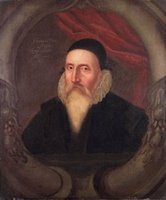
John Dee: mathematician, scientist, astronomer, occultist and alchemist, back in the days when such roles were perfectly compatible. He features somewhere in the conspiracy-tastic Foucault's Pendulum by Umberto Eco.
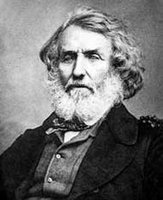
George Everest: Surveyor-General of India in the days of Empire, and the man after whom the Mountain is named. Not a bad way to be remembered really.

Bartholomew Roberts: early 18th century pirate, the most successful in terms of ships captured, with 456 to his name. Black Bart was his name, and plunder was his game. Arrrr!
 David Lloyd George: the last ever (should I add to date? I doubt there's a need frankly) Liberal Prime Minister of Britain, a consummate politician whose desire for power and influence could be at the expense of his party and his principles if necessary. His rise to the highest office came in a coalition government during the first world war, and his continuation of this pact after the war may have been personally successful, but ripped the Liberal party to pieces. His major political crime was the selliing of peerages for profit, making the whole dubious process more blatant than is normally the case.
David Lloyd George: the last ever (should I add to date? I doubt there's a need frankly) Liberal Prime Minister of Britain, a consummate politician whose desire for power and influence could be at the expense of his party and his principles if necessary. His rise to the highest office came in a coalition government during the first world war, and his continuation of this pact after the war may have been personally successful, but ripped the Liberal party to pieces. His major political crime was the selliing of peerages for profit, making the whole dubious process more blatant than is normally the case.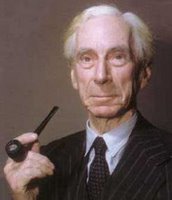
Bertrand Russell: right brainy chap. Mathematician, philosopher of great repute, pacifist and campaigner. Actively involved with the Campaign for Nuclear Disarmament, and Nobel Laureate for literature. One of the great thinkers of the last century.

Augustus John: artist, as was his sister Gwen, bohemian, and womaniser. He was known especially for his portraits of prominent figures of the day
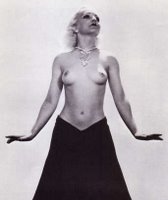
Peg Entwhistle: aspiring film and theatre actress, who, disillusioned with her lack of a breakthrough, became the first person to commit suicide by leaping from the Hollywood sign (or Hollywoodland as it still was in 1932) .

T E Lawrence: or Lawrence of Arabia, as he has gone down in history. Author of Seven Pillars of Wisdom and a prominent figure in the Arab Revolt during the First World War. A fascinating figure, his espionage work, his immersion in Arabic culture and his enigmatic private life continue to spark debate to this day.

Ivor Novello: the British matinee idol par excellence, Novello was a star of theatre, film and music, dominating the scene in the twenties and thirties. His name lives on in the yearly music awards.

Roald Dahl: every child's favourite writer, unless they're certifiably insane. The man behind Charlie and the Chocolate Factory and James and the Giant Peach, as well as deliciously twisted short stories for the more mature amongst us. Tales of the Unexpected indeed.
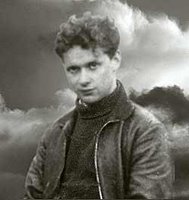
Dylan Thomas: quite possibly the greatest poet of the twentieth century. Liked a drink, or two, or twenty. Now off you go, and investigate his life and works

Richard Burton: distinguished actor, or at least he was until the cheap thrill of fame got in the way. Known more for his tempestuous relationship with Elizabeth Taylor, and his drinking, than for his undoubted talent.

Aneurin Bevan: the Great Man of the Left, a politician of principles and the talent to enact them. The architect of the National Health Service which, despite it's often parlous state, is something we can all be grateful for.

Glynis Johns: actress in numerous films from the golden era of British cinema, and first equal with Joan Greenwood for the hotly contested "best female speaking voice" title (George Sanders is the winner in the male category, fact fans). That's as fine a reason for celebration as any.

Tom Jones: owner of the world's largest collection of knickers-thrown-on-a-stage, and occasional singer. Usually to be found these days duetting with someone at least half his age.

Russell T Davies: the writer behind Queer As Folk, Bob and Rose, and The Second Coming. Oh, and some little show called Doctor Who...

Bonnie Tyler: once upon a time there was light in her life, now there's only love in the dark. Eighties singer with a big husky voice, and even bigger hair.

John Humphrys: grumpy chap who can be found haranguing politicians on Radio Four of a morning. Never knowingly cheerful.

Charlotte Church: she's a "crazy" "chick" with dubious taste in men, and a permanent place in the UK tabloids and showbiz gossip mags. Oh, and apparently she sings a bit too.